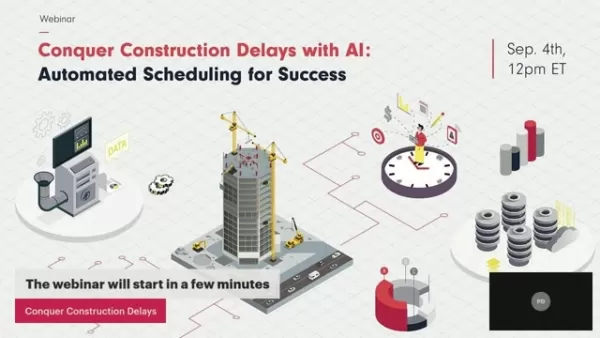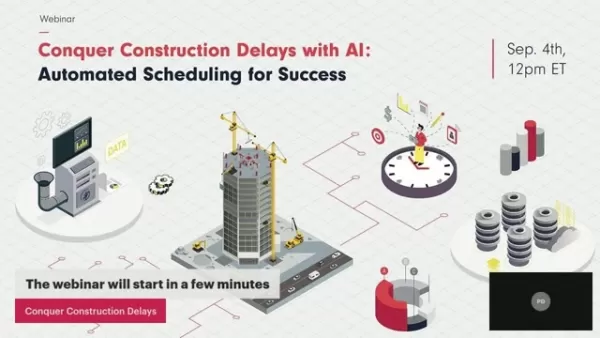Conquer Construction Delays with AI: Automated Scheduling
Understanding and Tackling Construction Delays with AI
Construction delays are a major headache in the industry, often leading to hefty cost overruns and missed deadlines. But there's a glimmer of hope on the horizon: artificial intelligence (AI) and machine learning (ML) are stepping up to revolutionize how we manage construction projects. These technologies are not just buzzwords; they're becoming essential tools for automating schedules and optimizing resource use. Let's dive into how AI is helping to overcome construction delays, boost efficiency, and steer projects toward success.
Key Insights
- AI can forecast potential delays by sifting through historical data, understanding task dependencies, and considering external factors.
- Automated scheduling helps in fine-tuning resource allocation, reducing conflicts, and enhancing efficiency.
- Machine learning adapts to evolving project conditions, keeping schedules both realistic and achievable.
- AI-driven analytics offer actionable insights that support proactive decision-making and risk management.
- Construction projects see improved timelines, lower costs, and higher success rates thanks to AI.
The High Cost of Construction Delays

Construction delays aren't just annoying; they can be financially devastating. When projects run late, costs skyrocket due to extended labor, rising material prices, and contractual penalties. These additional expenses can eat into profits and threaten the project's viability. Moreover, delays can tarnish a contractor's reputation, potentially costing them future business.
Traditional scheduling methods often depend on manual processes and human judgment, which are prone to mistakes and oversights. These methods struggle to handle the complex interdependencies and uncertainties typical in construction projects. Without real-time data, it's tough to make proactive decisions or allocate resources efficiently. Clearly, we need innovative solutions to cut down on risks and costs.
AI: Revolutionizing Construction Scheduling
Artificial intelligence is changing the game when it comes to managing construction delays and optimizing project outcomes. AI algorithms can handle massive datasets, including past project records, weather patterns, resource availability, and task dependencies. By analyzing this information, AI can spot potential risks and bottlenecks, predict delays, and create optimized schedules that boost efficiency and minimize disruptions.

Implementing AI in construction isn't just about the tech; it's about adopting a data-driven mindset that gives project managers the insights they need to act. AI-powered analytics provide a clear view of project performance in real time, allowing for timely interventions and course corrections. By using AI's predictive power, construction companies can manage risks better, cut costs, and deliver projects on time and within budget.
Embracing Innovation in Construction
Data-Driven Decision-Making

AI offers a wealth of insights that can transform project management into a more data-driven process. Real-time data allows teams to make quicker, more informed decisions, which can save time and money during project completion.
For instance, by analyzing data, construction companies can evaluate subcontractor performance and pinpoint areas for improvement to boost overall efficiency. Similarly, by forecasting potential supply chain disruptions, data-driven insights help secure alternative suppliers or stock up on critical materials to avoid delays.
This approach enhances strategic planning and resource allocation, providing real-time data and insights that improve decision-making. It also fosters better communication and transparency within construction companies.
The Pros and Cons of Using AI to Conquer Construction Delays
Advantages
- Better time management and project efficiency
- Cost savings through smarter resource allocation
- Proactive risk management
- Enhanced decision-making with real-time data analysis
- Higher project success rates
Challenges
- Initial costs for AI software and training
- Concerns about data availability and quality
- Difficulty integrating with existing systems
- Resistance to change among project stakeholders
- Potential job displacement in some construction roles
Frequently Asked Questions
How accurate are AI-driven delay predictions?
The accuracy of AI-driven delay predictions hinges on the quality and quantity of historical data used to train the algorithms. With robust training, AI models can achieve accuracy rates of 80% or more.
What are the main challenges of implementing AI in construction scheduling?
The primary hurdles include securing enough quality data, integrating AI with existing systems, and overcoming resistance to change among project stakeholders.
Can AI completely eliminate construction delays?
While AI can significantly reduce construction delays, it can't eliminate them entirely. Unexpected events and external factors will always introduce some uncertainty.
Related Questions
What data does AI need for effective construction scheduling?
To effectively use AI for construction scheduling, several key data inputs are crucial. AI needs data on task dependencies to anticipate potential bottlenecks and future issues. Understanding resource allocation helps machine learning optimize the use of workers and equipment, reducing risks. Additionally, AI considers external factors like weather changes, material deliveries, and regulatory updates to plan schedules more accurately. These elements contribute to better project insights, reduced costs, and improved timelines.
Related article
 AI Reimagines Michael Jackson in the Metaverse with Stunning Digital Transformations
Artificial intelligence is fundamentally reshaping our understanding of creativity, entertainment, and cultural legacy. This exploration into AI-generated interpretations of Michael Jackson reveals how cutting-edge technology can breathe new life int
AI Reimagines Michael Jackson in the Metaverse with Stunning Digital Transformations
Artificial intelligence is fundamentally reshaping our understanding of creativity, entertainment, and cultural legacy. This exploration into AI-generated interpretations of Michael Jackson reveals how cutting-edge technology can breathe new life int
 Does Training Mitigate AI-Induced Cognitive Offloading Effects?
A recent investigative piece on Unite.ai titled 'ChatGPT Might Be Draining Your Brain: Cognitive Debt in the AI Era' shed light on concerning research from MIT. Journalist Alex McFarland detailed compelling evidence of how excessive AI dependency can
Does Training Mitigate AI-Induced Cognitive Offloading Effects?
A recent investigative piece on Unite.ai titled 'ChatGPT Might Be Draining Your Brain: Cognitive Debt in the AI Era' shed light on concerning research from MIT. Journalist Alex McFarland detailed compelling evidence of how excessive AI dependency can
 Easily Generate AI-Powered Graphs and Visualizations for Better Data Insights
Modern data analysis demands intuitive visualization of complex information. AI-powered graph generation solutions have emerged as indispensable assets, revolutionizing how professionals transform raw data into compelling visual stories. These intell
Comments (4)
0/200
Easily Generate AI-Powered Graphs and Visualizations for Better Data Insights
Modern data analysis demands intuitive visualization of complex information. AI-powered graph generation solutions have emerged as indispensable assets, revolutionizing how professionals transform raw data into compelling visual stories. These intell
Comments (4)
0/200
![JoseJackson]() JoseJackson
JoseJackson
 August 23, 2025 at 7:01:18 AM EDT
August 23, 2025 at 7:01:18 AM EDT
AI scheduling in construction sounds like a game-changer! 🤖 Curious how accurate these predictions are in real projects—any examples of it saving big bucks?


 0
0
![AnthonyRoberts]() AnthonyRoberts
AnthonyRoberts
 August 21, 2025 at 11:01:17 PM EDT
August 21, 2025 at 11:01:17 PM EDT
AI scheduling in construction sounds like a game-changer! Can't wait to see how it tackles those endless delays. 🏗️ Anyone tried this tech yet?


 0
0
![HarryRoberts]() HarryRoberts
HarryRoberts
 August 20, 2025 at 5:01:15 AM EDT
August 20, 2025 at 5:01:15 AM EDT
AI scheduling sounds like a game-changer for construction! I wonder how accurate it is compared to traditional methods. Could save a ton of headaches! 😎


 0
0
![HarryRoberts]() HarryRoberts
HarryRoberts
 July 27, 2025 at 9:20:03 PM EDT
July 27, 2025 at 9:20:03 PM EDT
AI scheduling for construction sounds like a game-changer! Can't wait to see if it actually cuts delays or just adds more tech hype.


 0
0
Understanding and Tackling Construction Delays with AI
Construction delays are a major headache in the industry, often leading to hefty cost overruns and missed deadlines. But there's a glimmer of hope on the horizon: artificial intelligence (AI) and machine learning (ML) are stepping up to revolutionize how we manage construction projects. These technologies are not just buzzwords; they're becoming essential tools for automating schedules and optimizing resource use. Let's dive into how AI is helping to overcome construction delays, boost efficiency, and steer projects toward success.
Key Insights
- AI can forecast potential delays by sifting through historical data, understanding task dependencies, and considering external factors.
- Automated scheduling helps in fine-tuning resource allocation, reducing conflicts, and enhancing efficiency.
- Machine learning adapts to evolving project conditions, keeping schedules both realistic and achievable.
- AI-driven analytics offer actionable insights that support proactive decision-making and risk management.
- Construction projects see improved timelines, lower costs, and higher success rates thanks to AI.
The High Cost of Construction Delays

Construction delays aren't just annoying; they can be financially devastating. When projects run late, costs skyrocket due to extended labor, rising material prices, and contractual penalties. These additional expenses can eat into profits and threaten the project's viability. Moreover, delays can tarnish a contractor's reputation, potentially costing them future business.
Traditional scheduling methods often depend on manual processes and human judgment, which are prone to mistakes and oversights. These methods struggle to handle the complex interdependencies and uncertainties typical in construction projects. Without real-time data, it's tough to make proactive decisions or allocate resources efficiently. Clearly, we need innovative solutions to cut down on risks and costs.
AI: Revolutionizing Construction Scheduling
Artificial intelligence is changing the game when it comes to managing construction delays and optimizing project outcomes. AI algorithms can handle massive datasets, including past project records, weather patterns, resource availability, and task dependencies. By analyzing this information, AI can spot potential risks and bottlenecks, predict delays, and create optimized schedules that boost efficiency and minimize disruptions.

Implementing AI in construction isn't just about the tech; it's about adopting a data-driven mindset that gives project managers the insights they need to act. AI-powered analytics provide a clear view of project performance in real time, allowing for timely interventions and course corrections. By using AI's predictive power, construction companies can manage risks better, cut costs, and deliver projects on time and within budget.
Embracing Innovation in Construction
Data-Driven Decision-Making

AI offers a wealth of insights that can transform project management into a more data-driven process. Real-time data allows teams to make quicker, more informed decisions, which can save time and money during project completion.
For instance, by analyzing data, construction companies can evaluate subcontractor performance and pinpoint areas for improvement to boost overall efficiency. Similarly, by forecasting potential supply chain disruptions, data-driven insights help secure alternative suppliers or stock up on critical materials to avoid delays.
This approach enhances strategic planning and resource allocation, providing real-time data and insights that improve decision-making. It also fosters better communication and transparency within construction companies.
The Pros and Cons of Using AI to Conquer Construction Delays
Advantages
- Better time management and project efficiency
- Cost savings through smarter resource allocation
- Proactive risk management
- Enhanced decision-making with real-time data analysis
- Higher project success rates
Challenges
- Initial costs for AI software and training
- Concerns about data availability and quality
- Difficulty integrating with existing systems
- Resistance to change among project stakeholders
- Potential job displacement in some construction roles
Frequently Asked Questions
How accurate are AI-driven delay predictions?
The accuracy of AI-driven delay predictions hinges on the quality and quantity of historical data used to train the algorithms. With robust training, AI models can achieve accuracy rates of 80% or more.
What are the main challenges of implementing AI in construction scheduling?
The primary hurdles include securing enough quality data, integrating AI with existing systems, and overcoming resistance to change among project stakeholders.
Can AI completely eliminate construction delays?
While AI can significantly reduce construction delays, it can't eliminate them entirely. Unexpected events and external factors will always introduce some uncertainty.
Related Questions
What data does AI need for effective construction scheduling?
To effectively use AI for construction scheduling, several key data inputs are crucial. AI needs data on task dependencies to anticipate potential bottlenecks and future issues. Understanding resource allocation helps machine learning optimize the use of workers and equipment, reducing risks. Additionally, AI considers external factors like weather changes, material deliveries, and regulatory updates to plan schedules more accurately. These elements contribute to better project insights, reduced costs, and improved timelines.
 AI Reimagines Michael Jackson in the Metaverse with Stunning Digital Transformations
Artificial intelligence is fundamentally reshaping our understanding of creativity, entertainment, and cultural legacy. This exploration into AI-generated interpretations of Michael Jackson reveals how cutting-edge technology can breathe new life int
AI Reimagines Michael Jackson in the Metaverse with Stunning Digital Transformations
Artificial intelligence is fundamentally reshaping our understanding of creativity, entertainment, and cultural legacy. This exploration into AI-generated interpretations of Michael Jackson reveals how cutting-edge technology can breathe new life int
 Does Training Mitigate AI-Induced Cognitive Offloading Effects?
A recent investigative piece on Unite.ai titled 'ChatGPT Might Be Draining Your Brain: Cognitive Debt in the AI Era' shed light on concerning research from MIT. Journalist Alex McFarland detailed compelling evidence of how excessive AI dependency can
Does Training Mitigate AI-Induced Cognitive Offloading Effects?
A recent investigative piece on Unite.ai titled 'ChatGPT Might Be Draining Your Brain: Cognitive Debt in the AI Era' shed light on concerning research from MIT. Journalist Alex McFarland detailed compelling evidence of how excessive AI dependency can
 Easily Generate AI-Powered Graphs and Visualizations for Better Data Insights
Modern data analysis demands intuitive visualization of complex information. AI-powered graph generation solutions have emerged as indispensable assets, revolutionizing how professionals transform raw data into compelling visual stories. These intell
Easily Generate AI-Powered Graphs and Visualizations for Better Data Insights
Modern data analysis demands intuitive visualization of complex information. AI-powered graph generation solutions have emerged as indispensable assets, revolutionizing how professionals transform raw data into compelling visual stories. These intell
 August 23, 2025 at 7:01:18 AM EDT
August 23, 2025 at 7:01:18 AM EDT
AI scheduling in construction sounds like a game-changer! 🤖 Curious how accurate these predictions are in real projects—any examples of it saving big bucks?


 0
0
 August 21, 2025 at 11:01:17 PM EDT
August 21, 2025 at 11:01:17 PM EDT
AI scheduling in construction sounds like a game-changer! Can't wait to see how it tackles those endless delays. 🏗️ Anyone tried this tech yet?


 0
0
 August 20, 2025 at 5:01:15 AM EDT
August 20, 2025 at 5:01:15 AM EDT
AI scheduling sounds like a game-changer for construction! I wonder how accurate it is compared to traditional methods. Could save a ton of headaches! 😎


 0
0
 July 27, 2025 at 9:20:03 PM EDT
July 27, 2025 at 9:20:03 PM EDT
AI scheduling for construction sounds like a game-changer! Can't wait to see if it actually cuts delays or just adds more tech hype.


 0
0





























